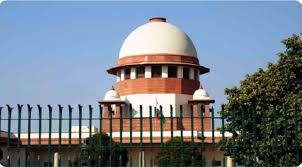The grievance of the Respondent is that upon superannuation of the previous JAG (Air), despite meeting the criteria for promotion to AVM, no promotion board was formed to consider the Respondent for the aforesaid vacancy and instead, it was eventually decided that he would be considered for promotion in his parent branch along with his course mates in Promotion Board 1/2015. (Para 3)
As such, he was considered in the said Promotion Board along with 9 other persons. Other persons, apart from him were found eligible to fill up the position of JAG (Air) since no other persons, apart from the Appellant were found to have the requisite legal training in accordance with the AFI 71/74. Hence, he was recommended for the position of AVM, which however, was not accepted by the Ministry of Defence[For brevity, ‘MoD’]. (Para 4)
It is on such non-acceptance of the recommendation of the Promotion Board that, the dispute before us, began. (Para 5)
Whether the Tribunal could have issued a direction to the Government to frame a policy for filling up the post of JAG (Air)? (Para 12.1)
Whether the Tribunal could have directed that the Respondent would continue functioning in such capacity despite non-acceptance of the Promotion Board’s recommendation till such time that the policy is framed by the Government and be given an opportunity for consideration by the promotion board constituted under such new policy? (Para 12.2)
Making policy, as is well recognised, is not in the domain of the Judiciary. The Tribunal is also a quasi-judicial body, functioning within the parameters set out in the governing legislation. Although, it cannot be questioned that disputes in respect of promotions and/or filling up of vacancies is within the jurisdiction of the Tribunal, it cannot direct those responsible for making policy, to make a policy in a particular manner. (Para 17)
Thus, it only stands to reason then, that, a Tribunal subject to the High Court’s jurisdiction under Article 226, cannot be permitted by law, to direct the framing of policy by the Government. (Para 22)
Therefore, given that the determination of the age of superannuation is within the domain of Executive policy, of which the Tribunal was fully aware, and that, even while seeking to do complete justice, this court ought not to, in ordinary circumstances, look past the commonly accepted age of superannuation, it is clear that the order of the Tribunal is sans basis. (Para 26)
In view of the above discussion, we are of the view that the Respondent’s challenge was barred at first instance, as he participated in the Promotion Board of 2015 and only challenged the non-formation of a policy for filling up the vacancy of AVM JAG (Air), finding himself to be unsuccessful in securing a promotion thereto. (Para 28.5)
SUPREME COURT OF INDIA
2023 STPL(Web) 481 SC
[2023 INSC 1074]
Union Of India Vs. Air Commodore Nk Sharma (17038) Adm/Lgl
Civil appeal no. 14524 of 2015-Decided on 14-12-2023
https://stpllaw.in/wp-content/uploads/2024/01/2023-STPLWeb-481-SC.pdf







